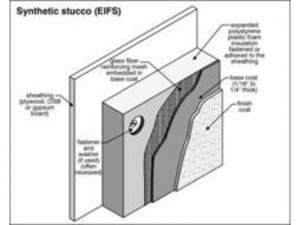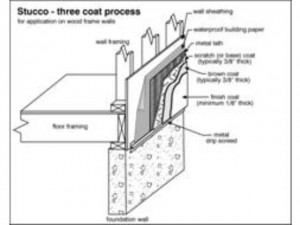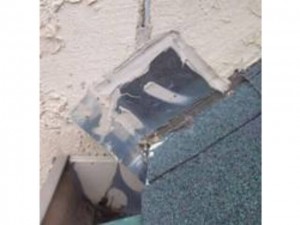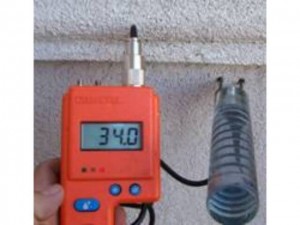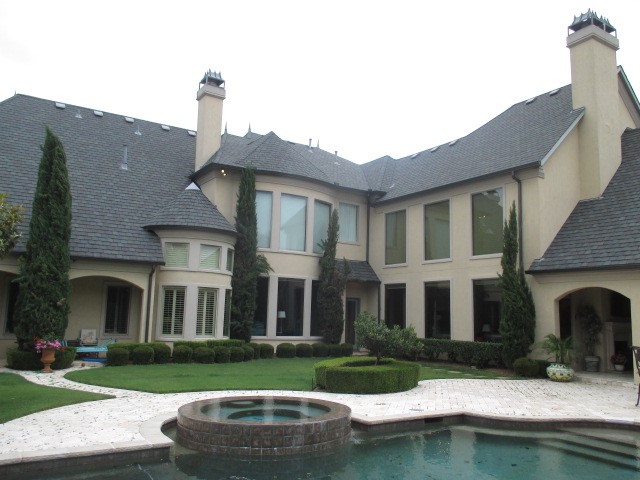
The A-Action Team offers both our residential and commercial building inspection clients a full range of EIFS, or Exterior Insulated Finishing Systems, (sometimes referred to as “synthetic stucco”) and Traditional Hard Coat Stucco Inspections.
Performing a EIFS Inspection of Traditional Stucco Inspection
A moisture inspection is intended to identify installation defects, locate areas of high moisture content in the sheathing and framing, to identify areas where the substrate has already been damaged by water, and to identify areas of potential moisture intrusion. Often, a stucco moisture inspection will detect leaks that are not related to the stucco system at all.
For example, our inspectors have located plumbing leaks, roof leaks and leaks from shower and bathtub enclosures during stucco moisture inspections. In a standard stucco moisture inspection both an infrared camera (thermal imaging technology) and a non-intrusive moisture scanner are used to identify areas of probable high moisture content. In areas where the scanner indicates high moisture content probability a probe moisture meter is inserted to test for the moisture content of the substrate and to test for firmness or damage to the substrate. The probe moisture meter is also used at random locations throughout the system, and in areas where potential moisture intrusion typically occurs, such as near windows. High moisture content in the probe reading indicates that water intrusion has indeed occurred and may be causing structural damage to the building. If the probe indicates that the substrate is soft, this could be a sign that significant damage has already occurred. The probe moisture meter will make two small ice pick-sized holes in the surface, which are then sealed by the inspector with color matching industry-approved sealant.
Our Stucco Inspection Includes:
Inspection Protocols Used
- A Visual Examination of the condition of the stucco system, exterior sealants, flashings, windows, doors, roof-to-stucco transitions, parapets, gutters, deck-to-building connections, stucco terminations and any penetrations through the stucco system.
- Infrared Thermal Imaging (Interior & Exterior)
- Electronic Surface Moisture Scanning
- Invasive Moisture Testing of the Structure (we test the moisture levels of the building framing behind the stucco cladding system and map the moisture readings for every elevation)
- Substrate Firmness Testing (test probe sites are also measured with the SRT or Hammer Probe to determine the condition of the substrate)
- Building Moisture Infiltration Analysis
- General Building Leak Detection
- Full Moisture Mapping Report and Remediation Recommendations
We DO NOT perform any remediation or repair work. We are not stucco remediation/installation contractors. We are certified leak detection experts who provide an unbiased, professional, third party reporting on the condition of the structure.
- Exterior Design Institute (EDI) Standards of Practice for Stucco Assessment
- EIFS Industry Members Association (EIMA) Standards of Practice for Stucco Assessment
- ASTM C 926 - Standard Specification for Application of Portland Cement-Based Stucco
- ASTM Standards for the different types of Exterior Insulation and Finish Systems
Inspector Credential
- Certified Exterior Insulation and Finish Systems (EIFS) & Stucco Third Party Inspector – Exterior Design Institute (EDI)
- Certified Adhered Stone Inspector - Exterior Design Institute (EDI)
- Certified Third Party Moisture Analysis Inspector – Exterior Design Institute (EDI)
- Level I Thermal Imaging / Infrared Thermography For Building, Roofs and Mechanical – The Snell Group
- Licensed Professional Building Inspector
Stucco on the other hand is plaster Portland cement. The stucco assembly usually includes a substrate over the framing members (there is an open framing system) with a moisture barrier present, self furring lath, plaster cement basecoat, and finally the hard coat finish.
Both systems have their advantages and disadvantages. However, it is the EIFS that has had the most problems. Read further about EIFS and its problems below.
Our clients that have used our inspection services on their non-EIFS homes know how thorough and professional we are. We bring that same type of professionalism and thoroughness into the EIFS field also. If you’re serious about finding out if you have moisture problems, contact us or give us a call at (972) 572-4500 today and we will be happy to discuss your home or property with you.
For More EIFS Information: EIMA – EIFS Industry Members Association | EDI – Exterior Design Institute

